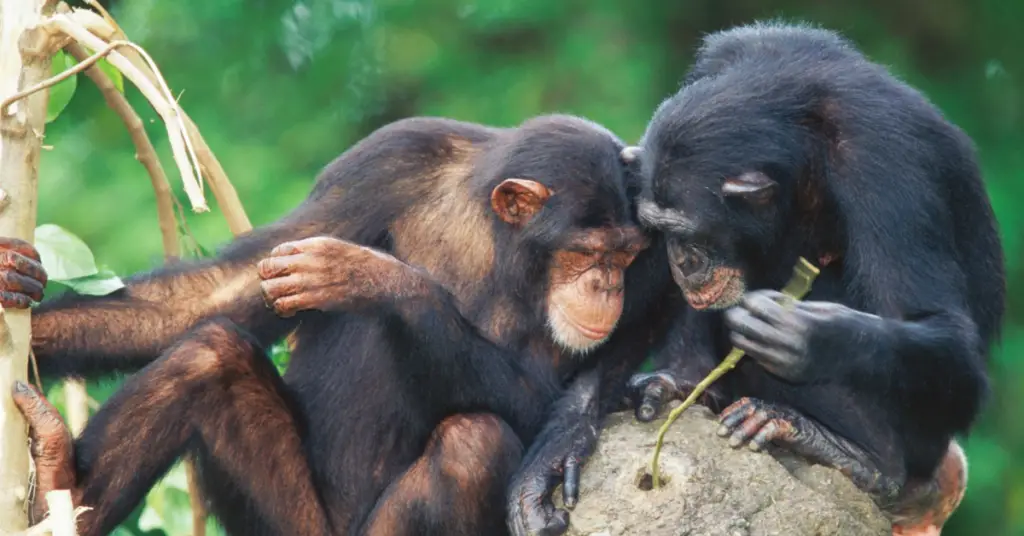Brief overview of animal intelligence
Animal intelligence refers to the cognitive abilities and problem-solving skills exhibited by various animal species. Different animals exhibit different levels and types of intelligence, ranging from basic instinctual behavior to complex cognitive processes such as problem-solving, tool use, and communication.
Animal intelligence is studied through various methods such as behavioral observations, experiments, and brain scans, and has important implications for our understanding of evolution, animal welfare, and conservation.
Explanation of how intelligence is measured in animals
Intelligence in animals can be measured through various methods, although it can be challenging to quantify cognitive abilities in non-human species.
Here are some of the common ways intelligence is measured in animals:
Learning and memory tests: Researchers often test animals’ abilities to learn and remember tasks and information. For example, animals may be trained to complete a specific task or navigate a maze, and their performance is then assessed.
Problem-solving tests: These tests assess animals’ abilities to use their intelligence to solve problems, often involving obstacles or challenges that require innovative thinking and strategy.
Communication tests: Researchers also study how animals communicate with one another and with humans, and how they respond to different social cues and etc.
Overview of the animals included in the list
The list of 25 smartest animals in the world includes a diverse range of species from different animal groups, such as primates, cetaceans, carnivores, birds, and other mammals.
Here are some of them:
Chimpanzees: Considered the closest living relatives to humans, chimpanzees are highly intelligent primates known for their social and cognitive abilities.
Orangutans: Orangutans are intelligent great apes found in the rainforests of Borneo and Sumatra, known for their tool use and problem-solving skills.
Gorillas: Gorillas are the largest primates and exhibit complex social behaviors, communication, and problem-solving abilities.
Capuchin Monkeys: Capuchin monkeys are small New World primates known for their tool use and cooperative behavior.
Baboons: Baboons are Old World monkeys found in Africa, known for their social intelligence and problem-solving skills.
Bottlenose Dolphins: Dolphins are highly intelligent cetaceans known for their communication abilities, problem-solving skills, and complex social structures.
Orcas: Orcas, also known as killer whales, are apex predators in the ocean with complex social structures, communication, and hunting strategies.
Beluga Whales: Beluga whales are highly social and intelligent cetaceans found in the Arctic and sub-Arctic regions, known for their communication and problem-solving abilities.
Dogs: Domesticated dogs are highly intelligent and have a close relationship with humans, known for their problem-solving skills, communication, and ability to learn and follow commands.
Cats: Domesticated cats are intelligent and independent animals, known for their hunting abilities, communication, and problem-solving skills.
Wolves: Wolves are highly intelligent and social carnivores known for their hunting strategies, communication, and complex social structures.
Hyenas: Hyenas are intelligent and highly social carnivores found in Africa and Asia, known for their problem-solving skills, communication, and cooperative hunting.
African Grey Parrots: African Grey Parrots are intelligent birds with advanced communication abilities and problem-solving skills.Ravens: Ravens are highly intelligent birds known for their problem-solving skills, communication, and tool use.
Crows: Crows are highly intelligent and adaptable birds found worldwide, known for their problem-solving skills, communication, and tool use.
Kea Parrots: Kea parrots are intelligent and curious birds found in New Zealand, known for their problem-solving skills and playful behavior.
Elephants: Elephants are highly intelligent mammals with complex social structures, communication, and problem-solving skills.
Squirrels: Squirrels are intelligent rodents known for their problem-solving skills, communication, and ability to adapt to different environments.
Rats: Rats are highly intelligent rodents known for their problem-solving skills, communication, and ability to learn and adapt to different environments.
Pigs: Pigs are intelligent and social animals known for their problem-solving skills, communication, and ability to learn and follow commands.
Green Sea Turtles: Green sea turtles are intelligent reptiles found in tropical and subtropical oceans, known for their problem-solving skills and navigation abilities.
Octopuses: Octopuses are highly intelligent and adaptable marine animals known for their problem-solving skills, communication, and ability to manipulate objects.
Bonobos: Bonobos are highly intelligent primates closely related to chimpanzees, known for their social and communication abilities, as well as their peaceful and cooperative behavior.
New Caledonian Crows: New Caledonian crows are highly intelligent birds found in New Caledonia, known for their tool use and problem-solving skills, including the ability to create and use complex tools.
Honeybees: Honeybees are social insects known for their advanced communication abilities and problem-solving skills, including their ability to perform complex tasks and navigate using the sun’s position.
Explanation of their ranking based on intelligence
The ranking of smartest animals in the world is based on a variety of factors, including problem-solving ability, communication skills, social intelligence, and adaptability to different environments. The specific criteria used to rank each animal may vary depending on the study or expert opinion.
In general, the animals at the top of the list tend to have larger brains relative to their body size, complex social structures, and high levels of adaptability and learning ability. They also exhibit advanced problem-solving skills, such as the ability to use tools, communicate with others, and navigate complex environments.
For example, chimpanzees, orangutans, and gorillas are considered some of the most intelligent animals due to their advanced cognitive abilities, including tool use, communication, and problem-solving skills. Similarly, dolphins, orcas, and beluga whales are highly intelligent cetaceans with complex social structures, communication, and problem-solving abilities.
Dogs, cats, and pigs are domesticated animals with a close relationship with humans, known for their problem-solving skills, communication, and ability to learn and follow commands. Birds such as ravens, crows, and parrots are also highly intelligent with advanced communication abilities and problem-solving skills.
Finally, animals like elephants, rats, and squirrels are known for their high levels of adaptability and problem-solving skills, as well as their social behavior and ability to navigate complex environments.
Chimpanzees
Chimpanzees are one of the most intelligent animals in the world and are closely related to humans, sharing approximately 98% of our DNA. They are found in the forests of Central and West Africa and are known for their social intelligence, tool use, and problem-solving abilities.
Chimpanzees have been observed using tools such as sticks and rocks to accomplish tasks such as cracking open nuts or fishing for termites. They also have a sophisticated system of communication, using a combination of vocalizations, gestures, and facial expressions to convey meaning to others in their group.
In addition, chimpanzees have demonstrated advanced problem-solving skills, including the ability to plan ahead, understand cause-and-effect relationships, and learn from past experiences. They have also been observed exhibiting empathy and altruism towards other members of their group.
Chimpanzees are highly social animals and live in complex societies with hierarchies and alliances. They have a remarkable ability to form and maintain long-term relationships with other individuals and exhibit a range of emotions, including joy, sadness, and anger.
Orangutans
Orangutans are highly intelligent primates found in the rainforests of Borneo and Sumatra. They are known for their cognitive abilities, including problem-solving, tool use, and communication.
Orangutans have been observed using a wide range of tools, including sticks to extract insects from tree bark and leaves to fashion shelters. They also have a complex system of communication, using a combination of vocalizations, gestures, and facial expressions to communicate with each other.
In addition, orangutans have demonstrated advanced problem-solving skills, such as planning ahead and understanding cause-and-effect relationships. They have also been observed exhibiting empathy and self-awareness, indicating a level of cognitive sophistication not often seen in other animals.
Orangutans are also highly social animals, but unlike chimpanzees, they tend to live more solitary lives. They form close bonds with their offspring, however, and females have been observed sharing food and even defending each other from predators.
Gorillas
Gorillas are highly intelligent primates and one of the closest living relatives to humans. They are found in the forests of Central and West Africa and are known for their social behavior, communication skills, and problem-solving abilities.
Like chimpanzees and orangutans, gorillas have been observed using tools, such as sticks to measure the depth of water or break open termite mounds. They also have a complex system of communication, using a combination of vocalizations, gestures, and facial expressions to convey meaning to others in their group.
Gorillas have also demonstrated advanced problem-solving skills, such as the ability to use objects as weapons, and the ability to plan ahead and learn from past experiences. They are also capable of showing empathy and altruism towards other members of their group.
Gorillas are highly social animals and live in complex societies with hierarchical structures. They form close bonds with their family group and communicate through a range of vocalizations and body language. Gorillas also exhibit a wide range of emotions, including joy, sadness, and anger.
Capuchin Monkeys
Capuchin monkeys are a highly intelligent species of New World monkeys found in Central and South America. They are known for their problem-solving abilities, tool use, and social intelligence.
Capuchin monkeys have been observed using tools such as sticks and rocks to accomplish tasks such as cracking open nuts or digging for insects. They also have a complex system of communication, using a combination of vocalizations, gestures, and facial expressions to convey meaning to others in their group.
In addition, capuchin monkeys have demonstrated advanced problem-solving skills, including the ability to understand cause-and-effect relationships and plan ahead. They are also capable of exhibiting empathy and altruism towards other members of their group.
Capuchin monkeys are highly social animals and live in large groups with hierarchical structures. They form close bonds with their family group and communicate through a range of vocalizations and body language. They are also capable of recognizing themselves in a mirror, indicating a level of self-awareness not often seen in other animals.
Baboons
Baboons are a highly intelligent and adaptable species of Old World monkeys found throughout Africa and the Arabian Peninsula. They are known for their problem-solving abilities, social intelligence, and communication skills.
Baboons have been observed using tools such as sticks to access food and using vocalizations and body language to communicate with other members of their group. They have a highly complex social structure, with hierarchical rankings and social bonds that play a critical role in their daily lives.
In addition, baboons have demonstrated advanced problem-solving skills, such as the ability to understand cause-and-effect relationships and use tools to accomplish tasks. They are also capable of exhibiting empathy and altruism towards other members of their group.
Baboons are highly adaptable animals and can live in a variety of different habitats, from forests to savannas. They are also known for their resilience in the face of environmental challenges, such as drought and other natural disasters.
Bottlenose Dolphins
Bottlenose dolphins are a highly intelligent and social species of marine mammals found in oceans and coastal waters around the world. They are known for their problem-solving abilities, communication skills, and social intelligence.
Bottlenose dolphins have a highly complex social structure, living in groups known as pods that can number in the hundreds. They communicate through a range of vocalizations and body language, and have been observed exhibiting a high degree of cooperation and coordination in their hunting and other activities.
In addition, bottlenose dolphins have demonstrated advanced problem-solving skills, such as the ability to understand cause-and-effect relationships and use tools to accomplish tasks. They have also been observed exhibiting self-awareness, as demonstrated by their ability to recognize themselves in a mirror.
Bottlenose dolphins are also capable of exhibiting empathy and altruism towards other members of their group. They have been observed coming to the aid of sick or injured individuals, and even helping stranded humans in some cases.
They are highly adaptable animals and are known for their ability to learn and adapt to new situations. They have been trained to perform a variety of tasks in captivity, including performing tricks and assisting with marine research.
Orcas
Orcas, also known as killer whales, are a highly intelligent and social species of marine mammals found in oceans around the world. They are known for their problem-solving abilities, communication skills, and complex social behaviors.
Orcas have a highly developed social structure, living in groups known as pods that can number in the dozens. They communicate through a range of vocalizations and body language, and have been observed exhibiting a high degree of cooperation and coordination in their hunting and other activities.
In addition, orcas have demonstrated advanced problem-solving skills, such as the ability to understand cause-and-effect relationships and use tools to accomplish tasks. They have also been observed exhibiting self-awareness, as demonstrated by their ability to recognize themselves in a mirror.
Beluga Whales
Beluga whales are a highly intelligent and social species of marine mammals found in Arctic and sub-Arctic waters around the world. They are known for their problem-solving abilities, communication skills, and complex social behaviors.
Beluga whales have a highly developed social structure, living in groups known as pods that can number in the hundreds. They communicate through a range of vocalizations and body language, and have been observed exhibiting a high degree of cooperation and coordination in their hunting and other activities.
In addition, beluga whales have demonstrated advanced problem-solving skills, such as the ability to understand cause-and-effect relationships and use tools to accomplish tasks. They have also been observed exhibiting self-awareness, as demonstrated by their ability to recognize themselves in a mirror.
Dogs
Dogs are highly intelligent domesticated animals that have been bred by humans for various purposes, including companionship, herding, hunting, and security. They are known for their loyalty, trainability, and ability to communicate with humans.
Dogs have a highly developed social structure, living in packs or with human families. They communicate with each other and with humans through a range of vocalizations, body language, and other cues.
They have been observed exhibiting a high degree of cooperation and coordination in various activities, such as hunting and herding.In addition, dogs have demonstrated advanced problem-solving skills, such as the ability to understand cause-and-effect relationships and use tools to accomplish tasks. They have also been trained to perform a wide variety of tasks, including guiding the blind, detecting drugs and explosives, and assisting with search and rescue operations.
Cats
Cats are highly intelligent and independent animals that have been domesticated for thousands of years. They are known for their agility, hunting skills, and ability to communicate with humans and other cats.Cats have a complex social structure, living in groups known as colonies or as solitary animals. They communicate with each other and with humans through a range of vocalizations, body language, and other cues. They have been observed exhibiting a high degree of independence and self-sufficiency.
In addition, cats have demonstrated advanced problem-solving skills, such as the ability to understand cause-and-effect relationships and use their environment to accomplish tasks. They have also been trained to perform a variety of tasks, including hunting rodents, assisting with therapy, and even detecting certain medical conditions in humans.
Wolves
Wolves are highly intelligent and social animals that are native to many parts of the world. They are known for their incredible hunting skills, loyalty to their pack, and ability to communicate and work together to achieve their goals. Wolves live in packs, which are typically led by an alpha male and female. They communicate with each other through a range of vocalizations, body language, and other cues. They have been observed exhibiting a high degree of cooperation and coordination in various activities, such as hunting and raising their young.
In addition, wolves have demonstrated advanced problem-solving skills, such as the ability to understand cause-and-effect relationships and use their environment to accomplish tasks. They have also been trained to perform a variety of tasks, including guiding the blind, detecting scents for search and rescue, and even being used in military operations.
Hyenas
Hyenas are highly intelligent and social animals that are native to parts of Africa and Asia. They are known for their remarkable hunting skills, which involve a high degree of cooperation and communication within their clan. Hyenas live in clans that are usually led by a dominant female, and they communicate with each other through a range of vocalizations, body language, and other cues. They have been observed exhibiting a high degree of cooperation and coordination in various activities, such as hunting, scavenging, and defending their territory.
In addition, hyenas have demonstrated advanced problem-solving skills, such as the ability to understand cause-and-effect relationships and use their environment to accomplish tasks. They have also been trained to perform a variety of tasks, including detecting scents for research purposes.Hyenas are also capable of exhibiting empathy and affection towards other members of their clan, and they have been observed helping and caring for injured or sick individuals.
Despite their intelligence, hyenas have often been misunderstood and vilified by humans, particularly due to their association with scavenging and death. However, they play an important ecological role as scavengers and are known for their ability to control populations of certain prey species. Efforts are being made to protect and conserve hyena populations, recognizing their important role in maintaining healthy ecosystems.
African Grey Parrots
African Grey Parrots are highly intelligent and social birds that are native to the rainforests of West and Central Africa. They are known for their remarkable ability to mimic and understand human speech, as well as their problem-solving skills and emotional intelligence.
African Grey Parrots are highly social birds and are known to form strong bonds with their owners and other birds. They communicate with each other and with humans through a range of vocalizations, body language, and other cues. They have been observed exhibiting a high degree of empathy and sensitivity towards the emotional states of other birds and humans.
In addition, African Grey Parrots have demonstrated advanced problem-solving skills, such as the ability to understand cause-and-effect relationships and use their environment to accomplish tasks. They have also been trained to perform a variety of tasks, including identifying shapes and colors, counting, and even playing musical instruments.
African Grey Parrots are also known for their remarkable ability to mimic and understand human speech. They have been observed using words and phrases in context and even creating new phrases on their own. Their ability to understand and communicate with humans has made them highly sought-after as pets, but their intelligence and social needs require a high level of care and attention.
Ravens
Ravens are highly intelligent birds that are found throughout the world, including in forests, deserts, and urban areas. They are known for their remarkable problem-solving skills, communication abilities, and social intelligence.
Ravens are highly social birds and are known to form strong bonds with their family members and other members of their flock. They communicate with each other and with other species through a range of vocalizations, body language, and other cues. They have been observed exhibiting a high degree of empathy and sensitivity towards the emotional states of other birds and animals.
In addition, Ravens have demonstrated advanced problem-solving skills, such as the ability to use tools to accomplish tasks, understand cause-and-effect relationships, and even plan for the future. They have been observed using sticks and other objects to obtain food and using their environment to hide and store food for later use.
Ravens are also known for their remarkable communication abilities, including their ability to use complex vocalizations to convey messages and coordinate their behavior. They have been observed using different calls to communicate about different types of predators and other threats.
Crows
Crows are highly intelligent birds that are found throughout the world, including in forests, urban areas, and agricultural fields. They are known for their remarkable problem-solving skills, communication abilities, and social intelligence.
Crows are highly social birds and are known to form strong bonds with their family members and other members of their flock. They communicate with each other and with other species through a range of vocalizations, body language, and other cues. They have been observed exhibiting a high degree of empathy and sensitivity towards the emotional states of other birds and animals.
In addition, Crows have demonstrated advanced problem-solving skills, such as the ability to use tools to accomplish tasks, understand cause-and-effect relationships, and even plan for the future. They have been observed using sticks and other objects to obtain food and using their environment to hide and store food for later use.
Crows are also known for their remarkable communication abilities, including their ability to use complex vocalizations to convey messages and coordinate their behavior. They have been observed using different calls to communicate about different types of predators and other threats.
Kea Parrots
Kea parrots are a species of parrot found in the mountains of New Zealand’s South Island. They are known for their remarkable intelligence, curiosity, and problem-solving skills. Kea parrots have been observed using tools to accomplish tasks, such as using sticks to probe for food or to extract insects from tree bark. They have also been observed using their beaks and claws to manipulate objects, such as opening latches on cages or unscrewing the caps on bottles.
In addition to their impressive problem-solving abilities, Kea parrots are highly social and communicative birds. They have a complex system of calls and body language that they use to communicate with each other and coordinate their behavior. They also have a remarkable ability to recognize individual faces and voices, which allows them to form strong bonds with their human caretakers and recognize familiar visitors.
Elephants
Elephants are widely regarded as one of the most intelligent animals on the planet. They are social animals that live in family groups and have a highly developed sense of communication, empathy, and problem-solving skills.
Elephants have large brains and are capable of complex thinking and decision-making. They have been observed using tools to accomplish tasks, such as using sticks to scratch themselves or removing obstacles from their path. They also have excellent memories and are capable of recognizing individual humans and other animals they have encountered before.
In addition, elephants have a highly developed system of communication that involves a wide range of vocalizations, body language, and even seismic vibrations that can be felt through the ground. They are capable of communicating over long distances, and have been observed coordinating their behavior and working together to accomplish tasks, such as protecting their young from predators or accessing food and water sources.
Elephants are also known for their remarkable emotional intelligence and empathy. They have been observed exhibiting a range of emotions, including joy, grief, and even self-awareness. They have been known to comfort and console each other during times of distress, and have even been observed mourning their dead.
Squirrels
Squirrels are small, agile rodents that are commonly found in many parts of the world. While they may not be as well-known for their intelligence as some other animals on this list, they have been shown to exhibit a surprising range of cognitive abilities. Squirrels are highly adaptable and have a remarkable ability to solve problems and navigate complex environments. They have been observed using their memory and spatial awareness to locate food sources, such as nuts and seeds, that they have previously hidden away. They are also capable of complex decision-making, such as choosing the best route to a food source or avoiding potential predators.
In addition, squirrels are social animals that live in complex communities. They have a wide range of vocalizations and body language that they use to communicate with each other and coordinate their behavior. They also have a remarkable ability to remember individual squirrels they have encountered before, which allows them to form relationships and alliances with other members of their community.
Squirrels have also been observed exhibiting surprising levels of creativity and problem-solving ability. For example, they have been known to construct complex obstacle courses to reach food sources, such as leaping from tree branches to reach bird feeders. They have also been observed using their teeth to cut and shape objects, such as removing the lids from garbage cans to access food.
Rats
Rats are highly intelligent and social animals that have long been used in scientific research to study a wide range of topics, including learning and memory, behavior, and neuroscience. Rats are capable of complex problem-solving and have been shown to exhibit a remarkable ability to learn and adapt to new environments. They are also highly social animals that live in large communities and have a wide range of vocalizations and body language that they use to communicate with each other.In addition to their cognitive abilities, rats have a highly developed sense of smell and are capable of detecting a wide range of scents. They are also known for their ability to navigate complex mazes and solve puzzles, which has made them a valuable tool in the study of learning and memory.
Rats have also been shown to exhibit a high degree of empathy and compassion towards other rats. They have been observed engaging in behaviors that suggest they are capable of feeling empathy towards other rats in distress, such as sharing food and grooming each other. They have also been known to show signs of grief and mourning when a member of their community dies.
Pigs
Pigs are highly intelligent and social animals that have been shown to exhibit a wide range of cognitive abilities. Despite their reputation as farm animals, pigs have been found to be more similar to dogs and primates than to other farm animals in terms of their cognitive abilities.
Pigs have an excellent memory and have been shown to be capable of learning and remembering a wide range of tasks, such as navigating mazes and performing simple cognitive tests. They are also highly social animals that live in complex communities and have a wide range of vocalizations and body language that they use to communicate with each other.In addition to their cognitive abilities, pigs have a highly developed sense of smell and are capable of detecting a wide range of scents.
They have been used for centuries to locate truffles, and are now being trained to detect landmines and other explosives. Pigs have also been shown to exhibit a high degree of emotional intelligence and empathy towards other pigs. They have been observed engaging in behaviors that suggest they are capable of feeling empathy towards other pigs in distress, such as vocalizing and grooming each other. They have also been known to form strong social bonds with other pigs and exhibit signs of depression and grief when separated from their social groups.
Green Sea Turtles
Green sea turtles are fascinating creatures that exhibit a range of interesting behaviors and adaptations. While they are not typically considered to be among the most intelligent animals, they do possess a number of cognitive abilities that are well-suited to their unique marine environment.
One of the most remarkable abilities of green sea turtles is their ability to navigate across vast distances of open ocean to return to their nesting sites. They use a range of cues, including the position of the sun and stars, the Earth’s magnetic field, and the smell of chemicals in the water, to find their way back to their home beaches.
Green sea turtles also have a highly developed sense of smell, which they use to locate food, mates, and nesting sites. They are known to travel long distances to find their preferred feeding and nesting areas, and have been observed exhibiting complex migratory patterns.
In addition to their sensory abilities, green sea turtles have a range of social behaviors that are well-suited to their marine environment. They are known to form long-lasting bonds with their mates, and will often return to the same nesting sites year after year.
While green sea turtles may not possess the same cognitive abilities as some of the other animals on this list, they are fascinating creatures that have adapted to life in one of the most challenging environments on Earth. Their remarkable navigational abilities, sense of smell, and social behaviors make them a valuable subject for scientific study and a symbol of the beauty and complexity of the natural world.
Octopuses
Octopuses are incredibly intelligent and adaptable animals that exhibit a range of fascinating behaviors and cognitive abilities. They are known for their ability to change color and texture to blend in with their surroundings, and are able to squeeze through incredibly small spaces due to their soft bodies and flexible limbs.
One of the most remarkable abilities of octopuses is their ability to solve complex problems and use tools. In laboratory experiments, octopuses have been shown to be able to open jars and solve mazes in order to obtain food rewards. They are also capable of using tools, such as coconut shells or discarded shells, to create shelters for themselves. Octopuses have highly developed nervous systems and are able to process a wide range of sensory information. They are capable of detecting light and color, as well as a range of chemical cues in the water. They are also able to use their limbs to taste their environment, allowing them to explore and interact with their surroundings in a unique and complex way.
In addition to their cognitive abilities, octopuses are also highly social animals. They are known to engage in complex courtship rituals and communicate with each other using a range of visual and tactile cues. They also exhibit signs of play and curiosity, and have been observed engaging in games and exploring their environments in order to learn and discover new things.
Honeybees
Honeybees are social insects that are known for their remarkable abilities to communicate with each other, navigate their environments, and work together to build and maintain their colonies. Their intelligence is often overlooked due to their small size, but they are in fact one of the most fascinating and intelligent species of insects on the planet.
One of the most remarkable aspects of honeybee intelligence is their complex communication system. Honeybees use a combination of dance movements and pheromones to communicate the location of food sources and other important information to their fellow bees. This system is so effective that it allows bees to navigate to food sources up to several miles away from their colony.
In addition to their communication skills, honeybees also exhibit remarkable navigational abilities. They are able to use the position of the sun, the earth’s magnetic field, and other cues to navigate their way back to their hive, even when flying several miles away from it. This ability is known as “homing” and is crucial for the survival of the colony.
Honeybees also exhibit impressive cognitive abilities, such as the ability to solve complex problems and make decisions as a group. For example, when faced with a choice between two equally good food sources, honeybees are able to collectively decide which source to choose and communicate this decision to the rest of the colony.
Horses
Horses are widely recognized as intelligent animals, with a range of cognitive abilities. Here are some reasons why horses are considered smart:
Learning and problem-solving: Horses have good memories and can learn a variety of skills, from simple tasks like opening gates to more complex activities like navigating obstacles in an equestrian course. They can also learn to recognize different people and respond to voice commands.
Social intelligence: Horses are highly social animals and have a complex system of communication with each other. They can read and interpret body language and facial expressions, and are able to form strong bonds with both other horses and humans.
Emotional intelligence: Horses are also highly attuned to the emotions of those around them. They are known to be able to sense fear, anxiety, and other emotions in humans, and can react accordingly to keep their riders safe.
Adaptability: Horses are able to adapt to a variety of environments and situations, and are known for their resilience in the face of adversity. They have a natural ability to assess risk and respond accordingly, which makes them excellent partners in activities like search and rescue.
Recap of the smartest animals in the world
Each animal exhibits a unique set of adaptations and behaviors that enable it to thrive in its environment and interact with other members of its species. By studying these animals and their cognitive abilities, we can gain a better understanding of the nature of intelligence and the ways in which animals have evolved to survive and thrive in their environments.
In conclusion, animal intelligence is a complex and fascinating topic that has been studied for decades by scientists from a wide range of disciplines. While it is difficult to compare the intelligence of different species directly, researchers have developed a number of tests and methods for assessing cognitive abilities in animals, such as problem-solving, tool-making, and communication skills.
The animals included in this list are just a small sample of the many intelligent and remarkable species found throughout the animal kingdom. From chimpanzees and orangutans to honeybees and New Caledonian crows, these animals have demonstrated remarkable cognitive abilities that continue to fascinate and inspire researchers and animal lovers alike.
Understanding animal intelligence is not just an academic pursuit; it has important implications for the way we interact with and conserve the natural world. By recognizing the remarkable abilities of animals and their importance to the planet, we can work towards a more compassionate and sustainable future for all species.

Erzsebet Frey (Eli Frey) is an ecologist and online entrepreneur with a Master of Science in Ecology from the University of Belgrade. Originally from Serbia, she has lived in Sri Lanka since 2017. Eli has worked internationally in countries like Oman, Brazil, Germany, and Sri Lanka. In 2018, she expanded into SEO and blogging, completing courses from UC Davis and Edinburgh. Eli has founded multiple websites focused on biology, ecology, environmental science, sustainable and simple living, and outdoor activities. She enjoys creating nature and simple living videos on YouTube and participates in speleology, diving, and hiking.
- WILDLIFE THEMED T-SHIRTS
Cute Hedgehog Embroidered: Love Wildlife, Protect Nature Wildlife conservation tees
$35.00







